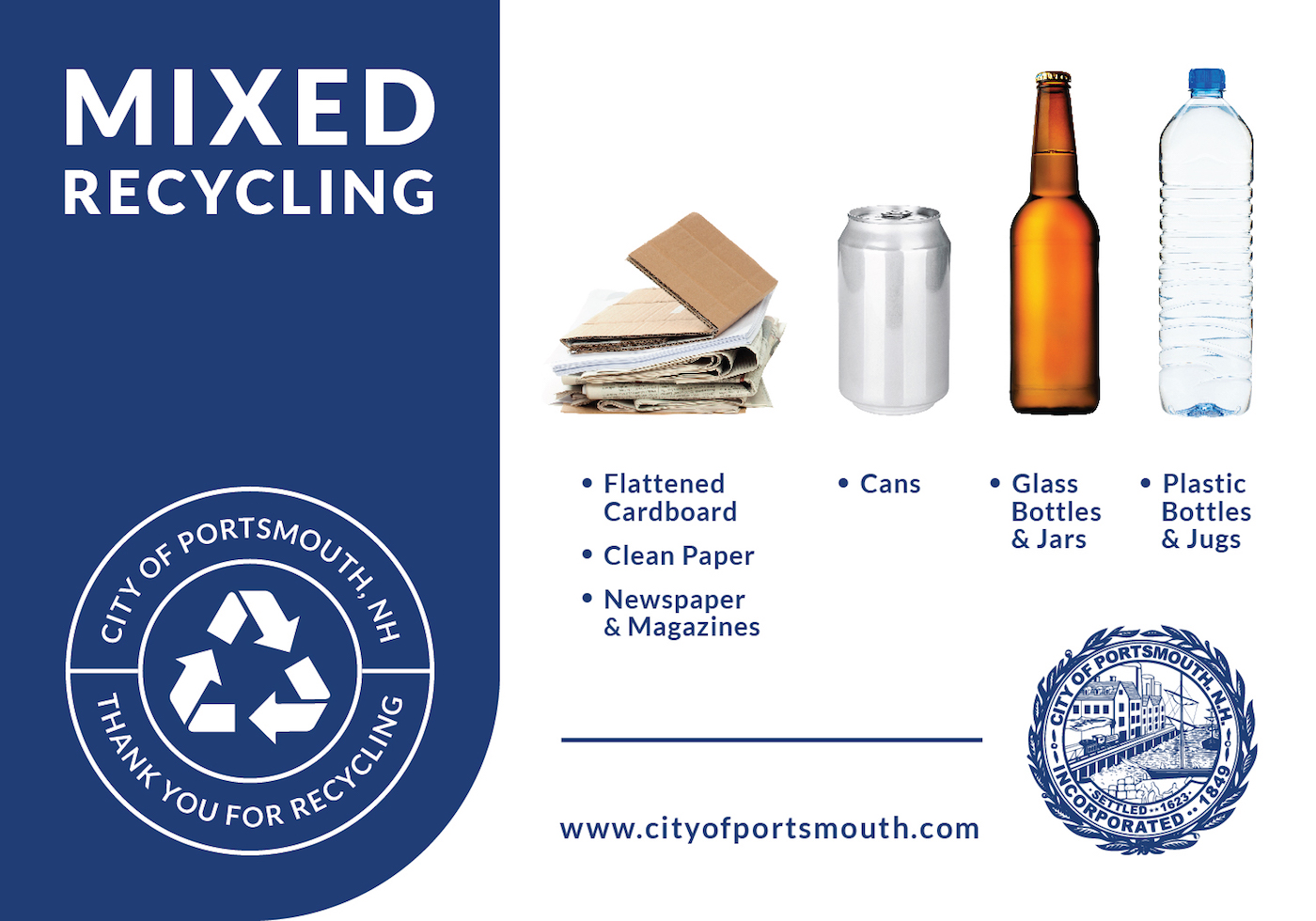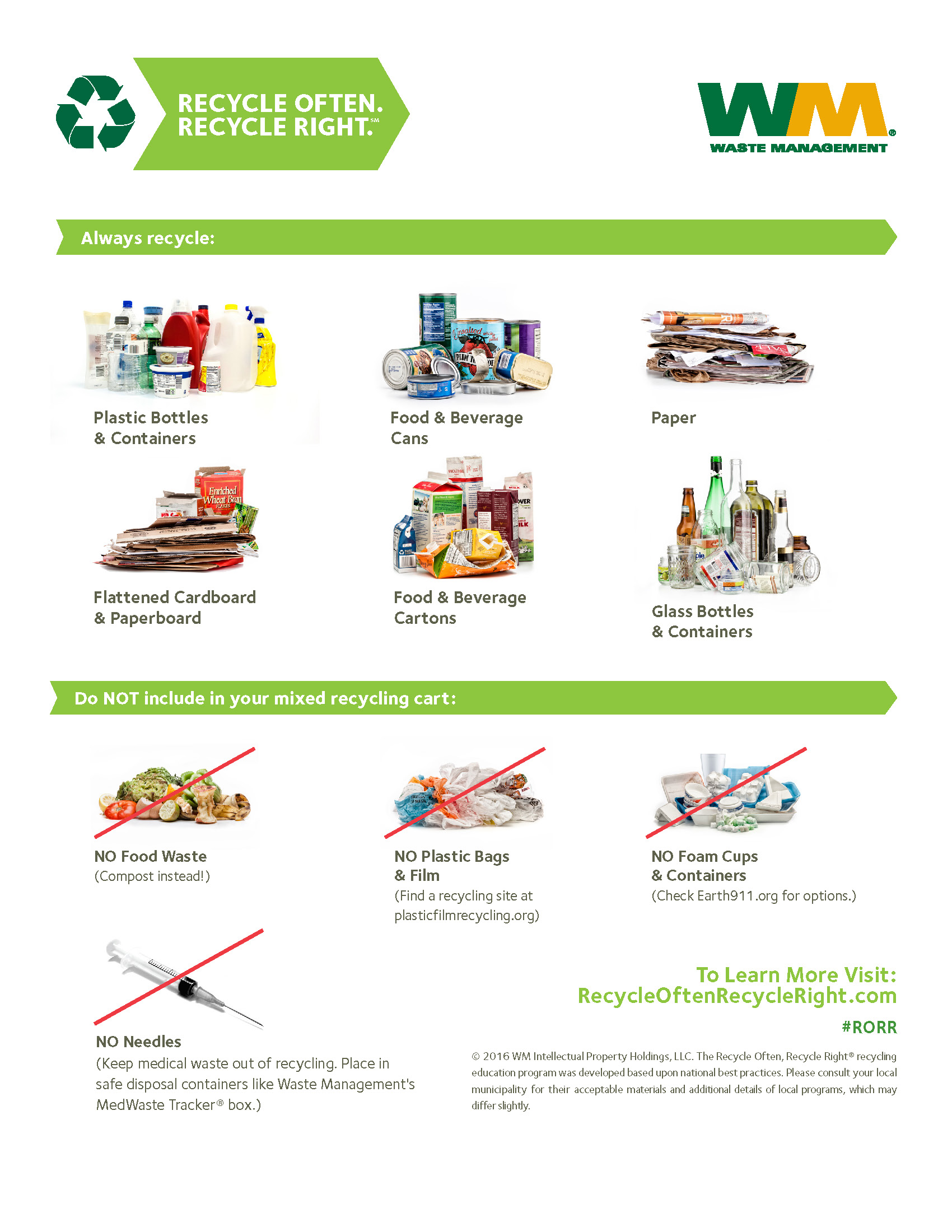Curbside Collection Resources

Portsmouth Recycling Guide
Single-Stream Recycling Made Easy!
Portsmouth uses a single-stream recycling system, meaning all accepted recyclables go into one bin—no sorting needed!
What Can Be Recycled?
Your recyclables must be dry, loose (not bagged), and include ONLY these items:
✅ Metal & Glass
- Aluminum cans – empty
- Steel and tin cans – empty
- Aerosol cans – empty (remove plastic lid)
- Glass food & beverage containers (brown, clear, or green) – empty
✅ Plastic
- #1 PET plastic bottles (with screw tops) – empty (caps can stay on)
- #2 HDPE plastic bottles (milk, water, detergent, shampoo, etc.) – empty
- #3-#7 plastic containers – empty (no expanded polystyrene)
✅ Paper & Cardboard
- Newspapers, mail, magazines, pamphlets
- Uncoated paperboard (cereal/food boxes)
- Office paper (uncoated)
- Corrugated cardboard – flatten to save space
- Phone books
What CAN'T Be Recycled?
Please keep these out of your recycling bin:
🚫 Plastic Bags & Bagged Items
- Plastic bags get tangled in equipment. Empty recyclables directly into the bin and reuse or recycle plastic bags at grocery stores.
🚫 Non-Recyclable Plastics
- Expanded polystyrene (Styrofoam)
- Plastic utensils, straws, cups with wax/plastic coating
- Flexible plastic (chip bags, juice/soup pouches)
🚫 Glass, Metal & Other Household Items
- Mirrors, light bulbs, cookware, and bakeware
- Hoses, cords, wires, and ropes (these jam recycling equipment)
- Scrap metal, auto parts, and appliances
🚫 Food & Liquids
- Food waste can be composted at the Public Works' Recycling Center
- Greasy pizza boxes? Tear off the clean part and recycle it
🚫 Hazardous & Medical Waste
- Needles, syringes, IV bags (dispose of safely in rigid containers)
- Propane tanks, batteries, construction debris
- Household chemicals
🚫 Clothing & Textiles
- Bedding, pillows, sheets, shower curtains, etc. (Donate instead!) Clothing collection location at Transfer Station.
💡 Need more details? Visit plasticfilmrecycling.org for plastic bag drop-off locations.
Keeping our recycling clean helps ensure materials get properly processed. Thank you for recycling the right way!
Yard Waste Disposal Guidelines
✅ How to Set Out Yard Waste:
- Use paper bags or a clearly marked trash barrel labeled "Yard Waste."
- Brush & Branches:
- Cut into 4-foot lengths or shorter
- No branches larger than 5 inches in diameter
- Bundle neatly with string or twine (max 1-foot diameter per bundle)
- Each bundle must weigh 50 pounds or less
- Click here for more details.
Keeping yard waste properly prepared helps ensure smooth collection—thank you for doing your part! 🌿
Bulky Waste
Specialty Item Recycling
Portsmouth residents can recycle the following specialty items at the Recycling Center—curbside collection is NOT available.
♻️ Accepted Items:
- Antifreeze
- Batteries (Alkaline batteries can go in regular household trash)
- Clothing
- Cooking oil & vegetable oil
- Eyeglasses
- Fluorescent light bulbs
- Oil & oil filters
- Empty propane tanks
📍 Bring these items to the Recycling Center for proper disposal!
Other Waste
RV Waste (Available at Pease Treatment Plant – Call (603) 427-1553)
